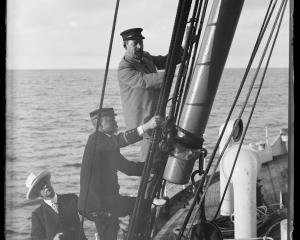
She was considering her future in Wanaka and said the incident had been a wake-up call about the state of the town’s medical services.
However, St John said it was satisfied with its resourcing in the town.
Carla Strang said about 3am one day in early February, she and husband, Jordan, had woken to the sound of their then 11-month-old son, Freddie, coughing and choking on his own vomit.
She said Freddie had been earlier diagnosed with croup by a doctor at the Wānaka Medical Centre. They were advised to get medical attention if he had difficulty breathing.
As Wānaka’s medical facilities are closed by 6pm, and an after-hours phone service ends at 11pm, their only option had been to call an ambulance.
Mrs Strang said they were given no indication from the 111 call when the ambulance would arrive. They began to get anxious after waiting for 10 minutes at the front door of their home.
"I was like, that’s really strange, because we’d said he wasn’t breathing well and it seemed urgent to us."
When Mr Strang called back, he was told by the operator that all of Wānaka’s ambulances were attending calls and they were sending one from Dunstan Hospital, about 45 minutes away.
"It was so scary," Mrs Strang said.
"I was just sitting here, looking out the door, holding my floppy baby and just wondering what do we do if he stops breathing?"
She was connected to a paramedic via video, who guided them through a few steps of first aid.
While Freddie’s condition had improved by the time the ambulance arrived, the attending paramedic made the decision to take him to Dunstan Hospital for observation.
Freddie has now recovered from his illness.
Mrs Strang commended the efforts of the emergency service workers but added that the entire experience had been a wake-up call for both her and her husband about the state of Wānaka’s healthcare services.
She and her husband had both begun to question whether Wānaka was the right place for them to raise their child.
"It’s very scary. You get lots of illnesses and stuff from daycare.
"It is our first baby, so we do worry sometimes that we’ve overreacted or something. But we’ve been reassured by people that we made the right decision in that moment for him."
Mrs Strang said she felt it was important to speak about her experience so that more people were made aware of the realities of Wānaka’s healthcare services and given the chance to consider their own needs.
St John Central Otago operations manager David Baillie, said, in a statement, based on the emergency ambulance workload in Wānaka, their resourcing model was appropriate and consistent with resourcing in similarly sized towns across New Zealand.
"Our data indicates that most patients from Wānaka that require transportation are taken to a local treatment centre, meaning the local ambulance stays in the community for the majority of the time."
He said during periods of high demand where incidents outnumbered the available resources, patients who were not experiencing a life-threatening condition might have to wait longer for an ambulance.
"We acknowledge the distress this may cause, however we prioritise patients with the greatest needs first."
- By Regan Harris











